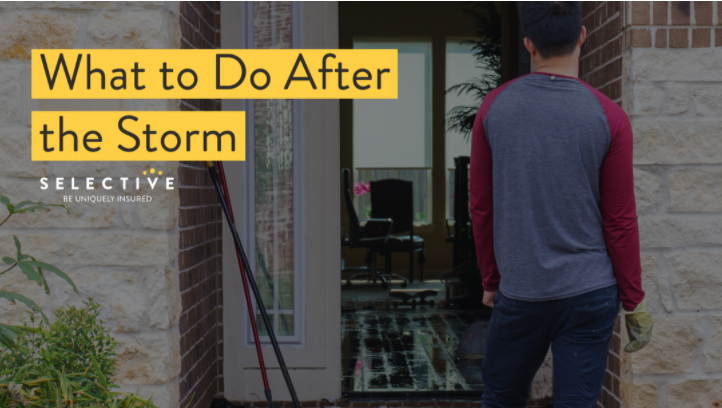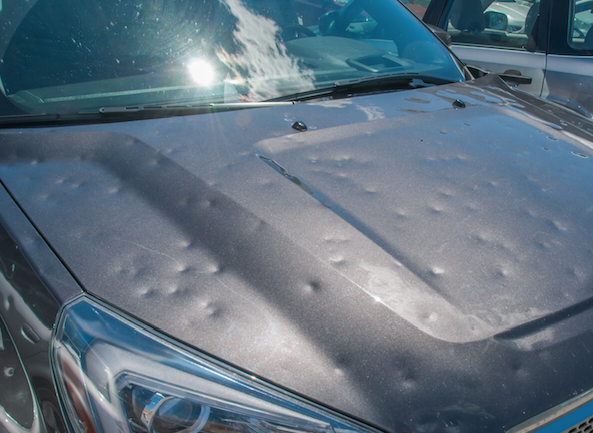Renovating Your Home to FORTIFIED Standard

If you’re working on your home or putting on a new roof, consider renovating to FORTIFIED standards. Developed by the Insurance Institute for Business & Home Safety (IBHS), FORTIFIED Home™ construction practices are designed to help homeowners and communities better weather future storms, including hurricanes, high winds, hail and severe thunderstorms. Building codes set a minimum standard for construction techniques and materials. Building FORTIFIED means exceeding those requirements.
The goal of building FORTIFIED is to take action today to make homes and communities more resilient to natural disasters tomorrow. Using data from more than 20 years of storm damage, IBHS created a set of standards for new and existing construction that can be affordable and can be incorporated into your home’s building design.
Three Levels of FORTIFIED Home Designations
- Bronze: As part of the bronze level, a wind-driven rain management system in the roof protects against water damage. It features ring shank nails to protect against wind uplift resistance, which provide double the strength of nails used on traditional homes. Another important technique is sealing the seams of your roof deck to prevent water intrusion from wind-driven rain.
- Silver: The silver designation adds features such as impact resistant windows and pressure-rated doors to protect the home from flying debris in strong winds.
- Gold: The gold designation focuses on creating a continuous load path by tying the roof to the walls, the walls to the floors, and the floors to the foundation to help make the home able to withstand hurricane force winds. Read More
The Pros and Cons of Composite vs. Wood Decking

You’ve decided it’s time to replace your outdoor deck and you’re ready to take it on as a DIY project, or you’ve decided to work with a licensed and bonded contractor for the heavy lifting. Before you start on such a critical project, it’s important to know that decking options have grown over the last several years, bringing new choices in composite plastic and wood products from which to construct your deck.
While they often cost more than wood, composite materials offer the promise of greater durability and less maintenance. Wood is still the most common choice for deck material,1 but it doesn’t last forever. Composites may be more durable, but they might lack the natural look and color you are looking for.
In June 2016, CBS News reported that while wood products still have a command on the market, composites are growing in popularity. Synthetic wood commands about 16 percent of the $7 billion-per-year deck market and appear to be gaining some traction.2
From cost to maintenance and durability to look, there are many things to think about as you decide between composite or wood for your next deck. Here are some pros and cons to consider before you decide which product to buy. Full Article
Hiring a Contractor Checklist and Tips
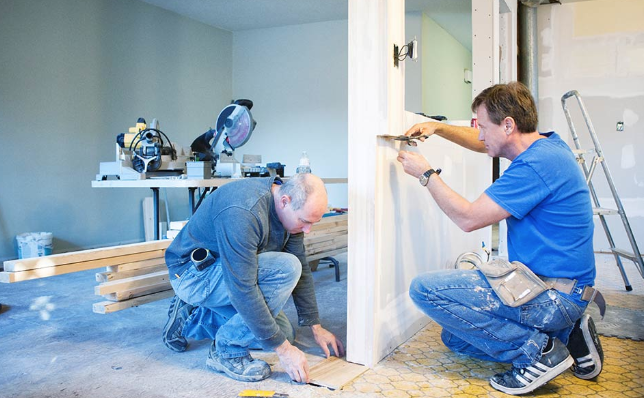
As you plan your next home renovation project, choosing the right contractor for the job is a critical first step in your planning process. You want to make sure you vet the quality of their work in advance, spell out in writing what work you want performed and agree upon the scope of the project, and inquire whether the contractor is properly licensed and insured in case something goes wrong.
This checklist compiles the top 10 tips to consider when selecting a contractor:
1. Get Multiple Estimates
Talk to several contractors and get written estimates from at least three. Make sure you’re comparing apples to apples when you get multiple estimates. Look at building materials, work methods, timelines and other factors that may vary by contractor. Be cautious of estimates that are too high or too low.
2. Hire Local, Licensed Contractors Whenever Possible
Local contractors are easier to contact if problems develop with the work in the future, and they are more likely to be familiar with building codes in your area. Ask the contractor for their local, physical address. Be suspicious of anyone who goes door-to-door or refuses to leave a contract overnight.
3. Check Their Past Work
How has their worked turned out in the past? Do they specialize in the kind of work you want done? Check references about the quality of their products, their workmanship and their customer service. Inquire about their professional reputation and years in business with the Better Business Bureau. A contractor with more than five years of experience is preferable.
4. Take Your Time Making a Sound Decision
Get multiple bids before making a decision. Don’t be pressured into making an immediate decision, particularly with regard to signing a contract. Be cautious when asked to pay a large deposit up front. Make sure to read the fine print on all estimates and contracts. If you’re having emergency repairs done and don’t have time to thoroughly research a contractor, ask neighbors, family or friends to see if they have had a good experience with an emergency services contractor. Read Full Article
Questions to Ask Your Home Inspector
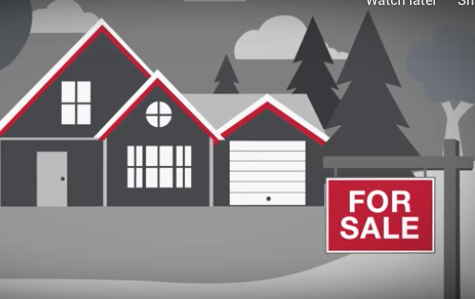
Moving into a newly purchased home can be one of the most stressful and challenging life moments for any homeowner. An important part of the process of purchasing a home, aside from the financial considerations, is the required home inspection. Once you make an offer on a home, it is critical to have a licensed home inspector go over it with a fine-toothed comb before you finalize the purchase. As the home buyer, it is your responsibility to choose an inspector wisely and stay involved through the entire process.
You might consider checking to see if there are any professional memberships or associations in your area that can recommend a licensed inspector. A helpful tool like the one available from the American Society of Home Inspectors might be a good place to start your search for a licensed home inspector in your area.
Choosing an Inspector
Finding a qualified, licensed and experienced home inspection professional is the first step. How and when the inspection and inspection report will be done is another important factor in choosing the right inspector for your needs and timeline. Here are some questions to ask potential candidates:
- Can I see your home inspector license?
A professional inspector should always carry their license. Do not contract an inspector who fails to show proof of certification. - Are you currently working/have you ever worked for the seller’s realtor?
Your home inspector should be working for you and you only. - What is your education, training and experience?
Home inspection is a unique discipline, and your inspector should have specific experience in residential inspections. The inspector should be able to provide you with their history in the profession, along with references. You should review your inspector’s residential inspection experience and make sure you are comfortable they have the experience you are looking for. Read More
Buying vs. Renting a House? Five Questions to Consider
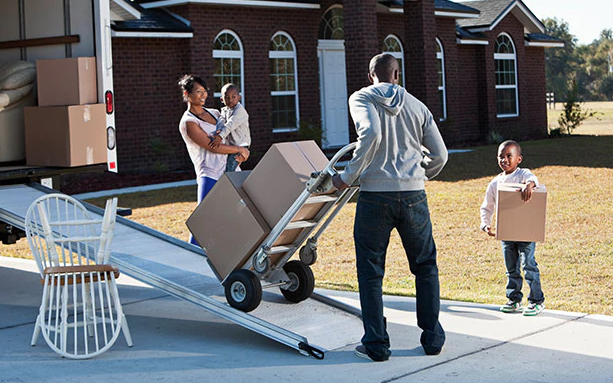
You’re thinking about moving from apartment life to a house, but you’re not sure you’re ready – financially or otherwise. How much yard do you want and how will you maintain it? How much living space do you need? What are the challenges of home ownership versus renting a home? What will the financial aspects be, particularly when it comes to protecting your home and belongings?
While you’re considering whether to rent or buy a house, here are five questions to consider that may help you figure out what’s best for you.
1. Are You Financially Prepared to Buy?
One early step toward home ownership is saving a down payment. You’ll also want to review your credit history and perhaps pay down outstanding debt before applying for a mortgage. If you’re just starting your career or have recently added a large amount of financial obligations such as a wedding, student loans, or a new car, you may need to get your finances in order before you buy a house. You’ll also want to figure out what your costs will be to close on a home, should you decide to buy. Keep in mind that, if you do decide to buy, some homeowners insurance policies provide a discount when you bundle multiple policies, such as auto. Be sure to look into this and other ways you could possibly save some money.
2. What’s Happening in the Local Real Estate Market?
Reviewing the local real estate market can help you determine when the right time is to buy vs. rent a home. If home prices are rising, you may feel motivated to move up your time frame and buy something before you’re priced out of the market. This may mean stepping up your savings plan and forgoing other large purchases, like a new car. Or you may decide to continue to rent for a few years, hoping that prices will level off or drop. Rising or falling interest rates can also affect the real estate market and likewise your buy vs. rent decision, as they will affect the overall amount of your mortgage payment. Read Full Artcile
How to Help Prevent Offline Identity Fraud

Contrary to popular belief, identity fraud does not always begin online. According to Travelers claim data, 44 percent of ID fraud cases happen when a person’s purse or wallet has been lost or stolen. Thieves can use the information they find inside for ID fraud, so here are some critical steps to help protect yourself and your identity.
Watch Your Wallet and Purse
Many people store personal information in their purses and wallets, making it easier for thieves to commit identity fraud. Help secure your identity by keeping your purse and wallet in a safe place and carrying only essentials when you go out. Leave credit cards you will not be using in a secure place at home. Unless it is absolutely necessary, avoid carrying Social Security cards, birth certificates or passports as they contain key pieces of personal information thieves could use to steal your identity.
Monitor Your Mail
Whether you are sending or receiving mail, take steps to help keep it safe from prying eyes. Never put outgoing checks, bill payments or financial information in your unlocked home mailbox. When you need to send out sensitive documents, consider using a secure postal mailbox or send them from the post office. If you have not signed up for electronic statements, be aware of when your credit card statements are scheduled to arrive. If they are late, call the credit card company to confirm if the statement was sent. Be sure to shred old bills and unnecessary financial records containing personal information. Read Full Article
6 Essential Travel Tips

Vacations are for reducing stress, not adding to it. Unfortunately, things can happen to make any vacation a stressful experience, no matter how beautiful the locale or destination.
Some things you are not able to control, such as the weather or flight delays. Other things, such as missing documents or stolen credit cards, have the potential to interrupt your fun but do not have to end your vacation if you are prepared.
Before you pack your bags and turn on your email out-of-office message, here are six tips to make your vacation one for the books:
- Make Copies of Your ID and Passport: Make two photocopies of your license or passport in case either is lost or stolen. Bring one copy and store it separately from your original, and leave another with a friend or relative. The U.S. Government also offers the Smart Traveler Enrollment Program, a free service for U.S. citizens and nationals traveling abroad. The program permits enrollment with the nearest U.S. Embassy or Consulate, which can assist during an emergency such as a lost or stolen passport.
- Streamline Your Wallet: Lost wallets are the leading cause of identity theft. Only carry the card(s) you plan to use on your trip, and leave your checkbook and the rest of your cards at home. If you decide to bring more than one credit card, consider stashing the extra, along with account information and customer service numbers for the cards you have with you, in a hotel safe or other secure location.
- Check Out Guides: Before you book that zip-lining, parasailing or river rafting trip, check online for any customer reviews. Seeing what others have to say about the company and the excursion can help you choose a safe and well-run adventure.
- Travel like a Local: When visiting any location, know your surroundings and plan your route in advance. Be aware of how the locals talk and dress, and consider whether certain actions will make you stand out as a tourist. Read More
A New Sweep of Smart Home Security Devices
Tech expert Stephanie Duchaine visits the CNET Appliance Lab and previews the latest generation of smart home security devices that delivers all-weather functionality, long-life batteries and hassle-free setup for safety-conscious households.
The views and opinions expressed in this video regarding products featured or other information are not necessarily Travelers’ views. Third-party names and trademarks referenced in this video are the property of their respective owners. Neither Travelers’ sponsorship of the video nor reference to third-party names, trademarks or products is intended as and does not imply, sponsorship, approval or endorsement of the products, statements or other information contained in the video. Read More
Make My Front Door Smarter
Join tech expert, Stephanie Duchaine, at the CNET Smart Home in San Francisco to see how we used smart tech to meet one family’s high-traffic, front door challenge.
The views and opinions expressed in this video regarding products featured or other information are not necessarily Travelers’ views. Third-party names and trademarks referenced in this video are the property of their respective owners. Neither Travelers’ sponsorship of the video nor reference to third-party names, trademarks or products is intended as and does not imply, sponsorship, approval or endorsement of the products, statements or other information contained in the video. Full Article
Preparing Your Home for Vacation

Vacation is for fun and relaxation. Help save yourself some worry about what could be happening at home by protecting it from theft and damage while you are away. Here is a checklist we have developed to help you have a relaxing and peaceful vacation.
- Make sure all electrical appliances are turned off.
- Clean the refrigerator of all perishable foods, and take out the garbage.
- Lock all windows and doors.
- Arrange to have the newspaper and mail held until your return, or have them picked up by a trusted neighbor.
- Arrange to have your lawn mowed (or snow shoveled) while you are away. Ask a neighbor to set out your trash on collection day and then retrieve empty cans and recycling bins the same day.
- Let a trusted neighbor know you will be away and have them keep an eye on your home. It is a good idea to leave your vacation address and telephone number with a neighbor so you can be reached in case of an emergency.
- Never leave your house key hidden outside your home.
- Set timers on interior lights.
- Make sure to unplug televisions, computers, and appliances susceptible to lightning and power surges.
- Advise your alarm company and local police if you will be gone for an extended period.
- Store jewelry and valuable items in a safe-deposit box.
- Arrange for the care of pets.
- Set the heating system to provide minimum heat of 55 degrees. Read Full Article













